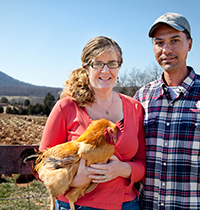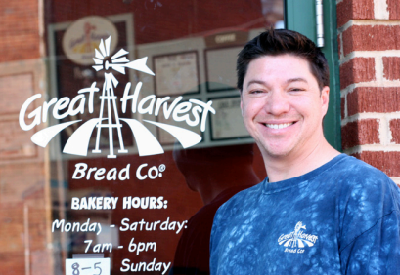
Since 2009, PEC has offered the Exploring the Small Farm Dream course to aspiring farmers—helping them take a long hard look at their dreams and to answer the question, “Is starting a farm business a good fit for me?” As the title of the course suggests, every participant comes to the course with their own unique dream—an idea that they want to explore. It is these dreams that form the starting point of the course, which evaluates student’s goals, skills, interests, physical and financial resources, and the merits of their ideas in order to settle on a course of action.
“The course is about helping people focus their energy toward goals that fit what they ultimately want—for some this ends up being full-time farming and for others it means identifying and pursuing an alternative vision,” explains Don Loock, agriculture and rural economy program manager for PEC and one of the course’s facilitators.
Pursuing the Dream
One explorer, Diana Boeke, who began co-teaching the course this year, had a dream to buy a property and start a diversified farm that she and her husband Amir could both work on full-time. After taking the course in 2010, Diana and her husband purchased a property with a house and some land less than a year later.
“Part of the reason we wanted to start farming in the Piedmont was because we were introduced to the Buy Fresh Buy Local guide,” explains Diana. “We had been aware of The Piedmont Environmental Council, and we thought if there’s an organization like this, then we’ll have what we need to make something like this [a small farm] viable.”
“Part of the reason we wanted to start farming in the Piedmont was because we were introduced to the Buy Fresh Buy Local guide.”
While Diana is sure to tell you it hasn’t been easy, with lots to learn and many mistakes to be made, she is also quick to point out how the course provided her with tools to help her make a go of it.
“The structure of the class helps you focus on specific things—what products are you interested in; is that viable; is it marketable. It helps you identify things so you don’t get lost,” explains Diana.
The course also gives participants access to a community of others with similar interests. Diana continues to count on the friendships that she made in the class. When she and her husband were interested in putting up a hoop house, they reached out to an alum who had experience building them. And when Diana and Amir needed some tractor work done on the farm, they once again called on someone they met through the course for assistance. The former classmate did tractor work in exchange for some freshly butchered chickens. Diana says, “It’s an instant farming community.”
Crafting a New Dream

For another alum, Pablo Teodoro, the course helped him redefine his dream and move in another direction. In 2009, Pablo took the course at the urging of his friend and, at the time, co-instructor for the course, Pablo Eliot. Teodoro was considering expanding his farming activities from a sideline, which provided his family with fresh produce, eggs and goats’ milk to a full-time business. He was also running a farmers’ market, and he was interested in helping support local farms and businesses.
Teodoro enthusiastically jumped into the course and started digging deeper into his goals. Through this process he began reconsidering whether his dream really was in line with what he wanted.
“There were things that I didn’t realize. When it becomes something you have to do for a living—it changes things,” says Teodoro. “So the kind of farming that I was doing was in large part pleasurable because I didn’t have to make a living [farming].”
When it becomes something you have to do for a living—it changes things…So the kind of farming that I was doing was in large part pleasurable because I didn’t have to make a living [farming].
Teodoro explains that through the course he began realizing his original dream did not meet some of his key goals, and he failed to take his outgoing personality into consideration . “I love people, so being alone, on the farm, would be terrible after a while. And I would probably go a little crazy. I hadn’t really accepted [this]. I was focusing on the money, on the risk, on the freedom and a couple of other things, and what I ignored were the real truths.”
In 2010, these truths led Pablo to explore a whole new dream—opening up Great Harvest Bread Co. in Old Town Warrenton. While his new dream is still filled with good food, fresh and local ingredients, it now also includes an opportunity for him to interact with customers and the larger community on a daily basis.
Meeting Pablo in his shop on Main Street, one can see this is a good fit. He seems thrilled that he’s been able to incorporate his love for farming and support local farms and businesses with his bakery. “In the beginning, most of the eggs we used came from my chickens. And the chickens were fed—at least half of their diet—was food scraps from the bakery.”
As he greets customers with warm hellos and a big smile—barely missing a beat in our conversation—he points to some of the items he has for sale and proudly says, “The honeys are local, the Shenandoah Spice is a local producer. Almost everything that we sell here comes from local producers. We are a local producer.”
The next course will be held on Wednesdays from January 14 through February 4 at Charlottesville’s Piedmont Virginia Community College. You can register through the PVCC Workforce Services, and the cost for the course and workbook is $160.
This article was featured in our Winter 2014 Member Newsletter, The Piedmont View.
